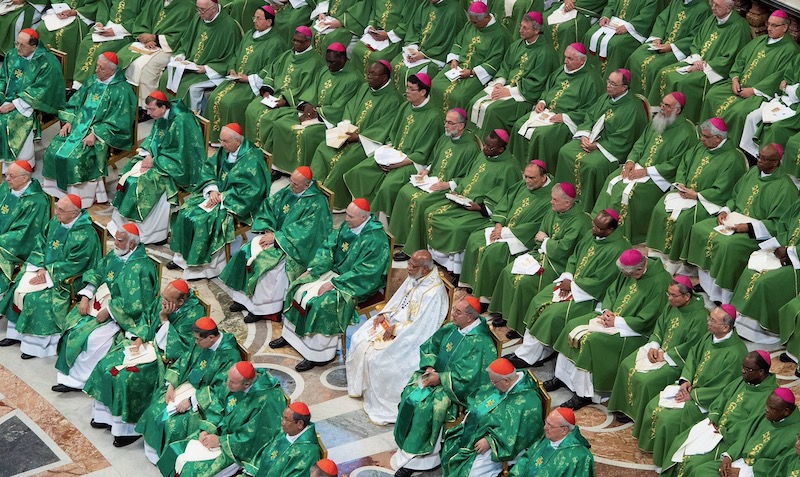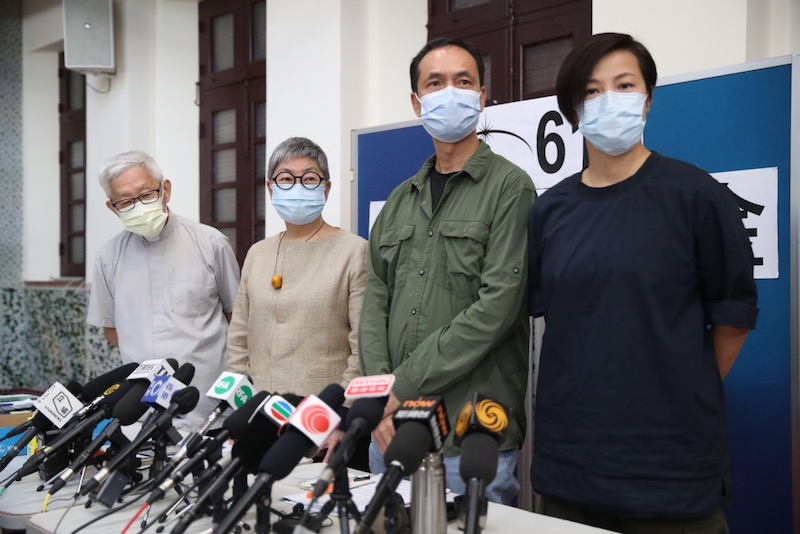It seems rather odd to call yourself a Catholic and then arrest your Cardinal. Yet that is what Hong Kong’s current Chief Executive Carrie Lam and her recently anointed successor John Lee have done.
Yesterday’s arrest of Hong Kong’s Bishop Emeritus, 90 year-old Cardinal Joseph Zen, marked a new low for the increasingly repressive Chinese Communist Party regime, which has been dismantling Hong Kong’s freedoms and autonomy with alarming speed in recent years. The Cardinal, an outspoken voice for democracy and human rights, was accused of “collusion with foreign forces” under the draconian National Security Law imposed by Beijing on Hong Kong two years ago. Together with internationally respected barrister Margaret Ng, popular singer Denise Ho and academic Hui Po-keung, Cardinal Zen had served as a trustee of the now defunct 612 Humanitarian Relief Fund, which provided legal aid for protesters and activists facing prosecution. The fund had been shut down last year and all four trustees were detained yesterday.
That the four were released on bail is welcome, but they should never have been arrested at all and the case should be dropped. That seems unlikely, however, under a regime which Hong Kong’s last Governor Lord Patten said yesterday is “hellbent on turning Hong Kong into a police state”. Cardinal Zen has spent the past few years visiting Hong Kong’s political prisoners in jail on an almost daily basis, to say Mass and to pray with and for them. It would be a heartbreaking tragedy if he ended up locked up alongside them.
The arrests came just three days after Hong Kong’s new Chief Executive John Lee was chosen in a so-called “election” that was a blatant farce. His electorate consisted of the 1,461 members of the election committee handpicked by Beijing. He ran unopposed. In the past, even though the system was rigged and Beijing’s pick always won, there was at least the pretense of a multi-candidate contest. This time no such pantomime was performed. Lee won with 1,416 votes – or 99 per cent – giving him the biggest landslide victory of any new Chief Executive since the handover. Not difficult, given that he had no opponent, he chose the voters, and he had locked up his critics. Hong Kong now has not simply Beijing-style democracy, but actually – as someone recently put it – Pyongyang-style rule “with better lighting”.
Lee is the symbol of Hong Kong’s transition from Asia’s most open city to one of its most repressive police states. A former cop, he has known nothing other than policing. His entire career before government was as a police officer, and in government his only positions were as former Chief Executive CY Leung’s Under-Secretary for Security and then Lam’s Secretary for Security. Until his appointment as Chief Secretary – number two – just under a year ago, his only experience was locking people up, beating people up, teargassing and pepper-spraying government critics into submission, denying police brutality, covering up rape and refusing any investigation or accountability. He has almost no experience of economic, infrastructure, housing, education, health and welfare, transportation or environmental policy. It is no wonder his manifesto is so thin. He only knows two things: how to say yes to Beijing and how to whack dissent. As Chris Patten put it: “He would not know the rule of law if it hit him in the eye with a plastic baton rod.”
Lee’s thuggery bodes ill for Hong Kong. In 2019 he visited Xinjiang, where the Chinese Communist Party regime is accused of genocide, and later told Hong Kong lawmakers they should take lessons from Beijing’s handling of the Uyghurs. He has made it clear he will fast-track further restrictions in Hong Kong, by implementing Article 23 of the Basic Law which would impose even tighter repression and by targeting what he calls “fake news”, a convenient metaphor for media criticism.
So it is in this context that perhaps yesterday’s arrests – shocking though they were – were not so surprising. The question we should now be asking is what do we do?
There are two specific stakeholders who must now act: the United Kingdom (and by extension her allies in the international community), and the Vatican.
Until now, the British government has done nothing to hold Beijing to account for dismantling Hong Kong’s freedoms in total breach of an international treaty, the Sino-British Joint Declaration. It has made some robust statements, and it has – generously and, in my view, courageously – extended a lifeline to Hong Kongers who need to flee the city and build a new life in freedom. The British National Overseas (BNO) scheme which the government announced two years ago enables potentially up to three million Hong Kongers to come to Britain. In the first year of the scheme’s operation more than 100,000 Hong Kongers have taken up the offer and been welcomed into our communities. All this is to be applauded, but it does nothing to change the situation on the ground or end the impunity with which Beijing is rampaging through Hong Kong.
So, the time has surely come for sanctions. Officials in Beijing and Hong Kong responsible for tearing up international treaty promises and committing human rights violations should be made to pay a price for their actions. Targeted sanctions should be applied. A recent Hong Kong Watch report found that at least nine Hong Kong officials and 12 members of Beijing’s puppet “patriots only” legislature own property overseas, including in the United Kingdom, the United States, Canada, Australia, Japan and France. Those properties should be seized and their assets frozen. And sanctions should be applied to others too, either through our Magnitsky sanctions scheme or by creating a bespoke sanctions regime. The United States has done this, and we should follow suit. Even if it does not change the situation immediately, it sends a message that actions have consequences, and it may just give some in the regime pause for thought.
The Vatican, too, must surely re-think its China policy now that one of its most senior leaders in Asia has been arrested. Ever since it signed a secret deal with Beijing on the appointment of bishops in 2018, the Vatican has been compromised. It has pursued a policy of appeasement, kowtowing to a regime credibly accused of genocide against the Uyghurs, intensifying persecution of Christians, continued atrocities in Tibet, forced organ harvesting and the destruction of Hong Kong’s freedoms. The Pope has been almost completely silent on these issues. The fact that the Vatican expressed “concern” about Cardinal Zen’s arrest in an underwhelmingly tepid statement was a welcome surprise – several Hong Kong Catholic friends told me they had not expected Rome to say anything.
But the time has now come to review the deal with Beijing. Yesterday’s events, Lord Patten said, “presumably drive a nail into the coffin of the attempts by the Vatican to establish some sort of deal with China’s Communists, who regard any sort of religion as a threat to their tyrannous grip on power.”
If the Vatican does not re-think, Catholics should make their views known to the Secretariat of State. “I hope that the Vatican and Catholics everywhere will protest about the arrest of a great Catholic pastor and advocate, and pray for his safety and well-being and that of the whole of Hong Kong,” Chris Patten said. I do too.
It is an interesting coincidence that in a statement issued yesterday by Hong Kong Watch – not a faith-based organisation – all five quotes came from people who happen to be Catholics. In addition to Lord Patten and myself, independent crossbench peer Lord Alton, former US Ambassador-at-Large for International Religious Freedom Sam Brownback and former EU Special Envoy for freedom of religion or belief Jan Figel spoke out. I hope the Vatican listens.
And perhaps Rome should consider its own sanction against Carrie Lam, John Lee and other so-called Catholics in Hong Kong who so zealously do Beijing’s dirty work. Maybe next to the hammer and sickle that they seem to venerate so enthusiastically, they should be given the bell, book and candle to drive the message home.
Benedict Rogers is co-founder and Chief Executive of Hong Kong Watch, and author of six books, including “From Burma to Rome: A Journey into the Catholic Church”. His new book, The China Nexus: Thirty Years In and Around the Chinese Communist Party’s Tyranny, will be published in October.



 Loading ...
Loading ...
What do you think?
You can post as a subscriber user ...
User comments (0)